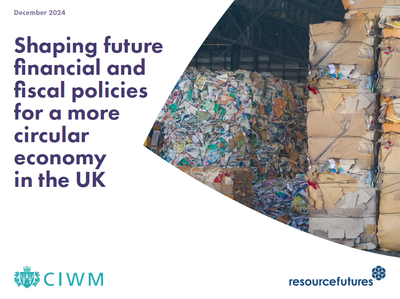New CIWM report : Shaping the future of financial policies for a circular UK economy

In an era marked by growing environmental challenges and the urgent need for sustainable development, the Chartered Institution of Wastes Management (CIWM) has released a pivotal report aimed at advancing the UK’s transition to a circular economy. Titled Shaping Future Financial and Fiscal Policies for a More Circular Economy in the UK, the report, authored by Resource Futures, provides a roadmap for crafting financial and fiscal policies that incentivize circularity effectively and equitably.
The call for nuanced incentives
The report identifies key strategies to refine existing policy frameworks. These strategies address the pressing need for modern fiscal measures to align with contemporary goals such as decarbonisation, waste reduction, and high-quality recycling. Among its recommendations are:
- Designing nuanced incentives: Focused on reuse, reduction, and decarbonisation, these incentives aim to deliver meaningful progress.
- Targeting high-impact sectors and materials: Policies must prioritize areas with the most significant environmental and economic benefits.
- Promoting reuse through Extended Producer Responsibility (EPR) schemes: EPR policies should actively encourage reuse alongside recycling.
- Enhancing fiscal levers: Existing tools should be recalibrated to create stronger incentives, particularly for inert materials.
- Investing in data and enforcement: Robust monitoring mechanisms are essential to ensure policy effectiveness and prevent unintended consequences.

The framework for circularity
The report’s research is grounded in three overarching aims of resource policy:
- Decarbonising the waste sector: This involves transitioning to lower-carbon waste management practices, such as adopting renewable energy sources, optimizing logistics for waste collection, and reducing greenhouse gas emissions from waste processing facilities. Decarbonisation is critical for aligning the waste sector with national climate goals and international commitments to carbon neutrality.
- Increasing recycling rates: The focus is not just on increasing the quantity of materials recycled but also on improving the quality of recycling. Higher-quality recycling processes yield better secondary materials, reduce contamination, and support the production of higher-value products. This aim also emphasizes closing the loop on materials to reduce dependency on virgin resources.
- Reducing resource consumption: By encouraging practices such as reuse, remanufacturing, and repair, this aim seeks to minimize the demand for virgin materials. Reducing resource consumption contributes to environmental sustainability, mitigates resource scarcity, and promotes economic resilience by maintaining the value of materials in the system for longer.
Key findings from the report
The full report offers an in-depth analysis of current policies, identifying gaps and opportunities. Key highlights include:
- Assessment of fiscal incentives: The report evaluates the impact of existing financial and fiscal policies, highlighting their successes, unintended consequences, and areas where they conflict or synergize with other policies. This thorough analysis provides a baseline for informed policy adjustments.
- Sector prioritization: Certain sectors and materials hold greater potential for achieving circularity. The report calls for targeted interventions in these high-impact areas to maximize environmental and economic benefits.
- Enhanced EPR schemes: Extended Producer Responsibility (EPR) policies are identified as pivotal tools for fostering circularity. The report emphasizes that EPR schemes should explicitly promote reuse and remanufacturing activities alongside recycling to achieve broader sustainability goals.
- Revenue reinvestment: Funds generated through fiscal measures should be strategically reinvested to drive systemic changes that facilitate the transition to a circular economy. Examples include infrastructure development, innovation in circular technologies, and capacity-building initiatives.
- Strengthened monitoring: Effective implementation of financial and fiscal policies relies on robust data collection, monitoring, and enforcement. These measures ensure that incentives achieve their intended effects and provide accountability for stakeholders.
Insights from industry leaders
Dan Cooke, CIWM’s Director of Policy, Communications, and External Affairs, underscores the report’s significance: “The benefits of incentivising a more circular UK economy, one where materials are kept in use for as long as possible, are clear. It creates jobs, enables economic growth, and delivers resource resilience and carbon reduction.”
Cooke emphasizes the need for well-crafted financial incentives to move the UK closer to a circular economy. “This timely piece of research provides useful insights for our sector, policymakers, governments, and the Circular Economy Taskforce,” he adds.
Susan Evans, Policy Lead at Resource Futures, highlights the dynamic nature of policy development: “The policy incentives for a more circular, lower-carbon economy need to be adjusted and improved over time as we learn from experience what works and where the gaps are. This report highlights areas where more nuanced fiscal and financial incentives are needed to drive not just more recycling, but higher-quality recycling that contributes more to the economy, as well as reuse and remanufacturing activities which can drastically reduce the environmental impacts of our resource use.”
A collaborative path forward
This report serves as a crucial resource for stakeholders across the waste management and circular economy sectors. By adopting its recommendations, policymakers and industry leaders can pave the way for a more sustainable and economically resilient future. As the UK grapples with the twin challenges of environmental degradation and resource scarcity, such efforts are not just timely but imperative.
For further details, readers can access the full report here.


